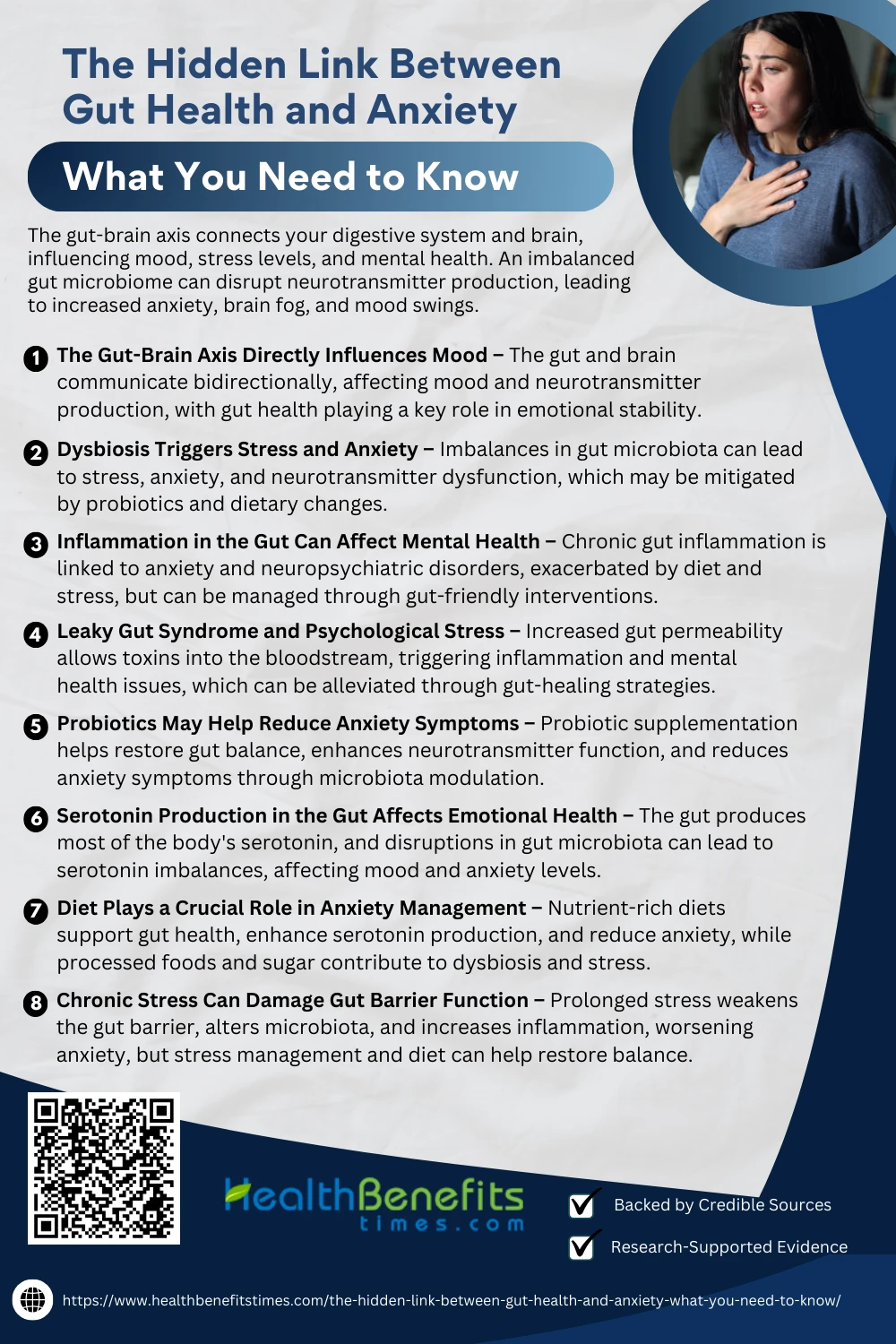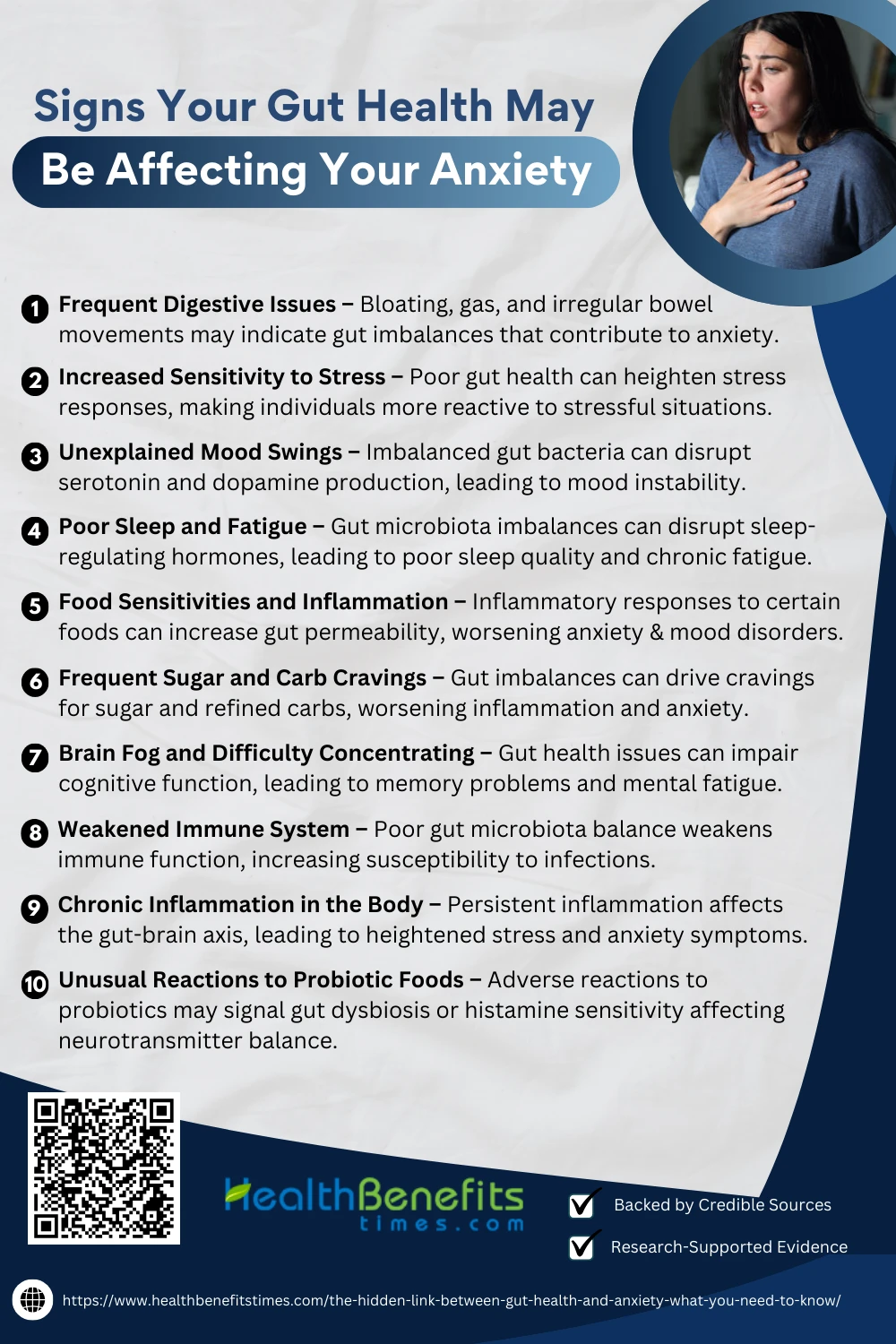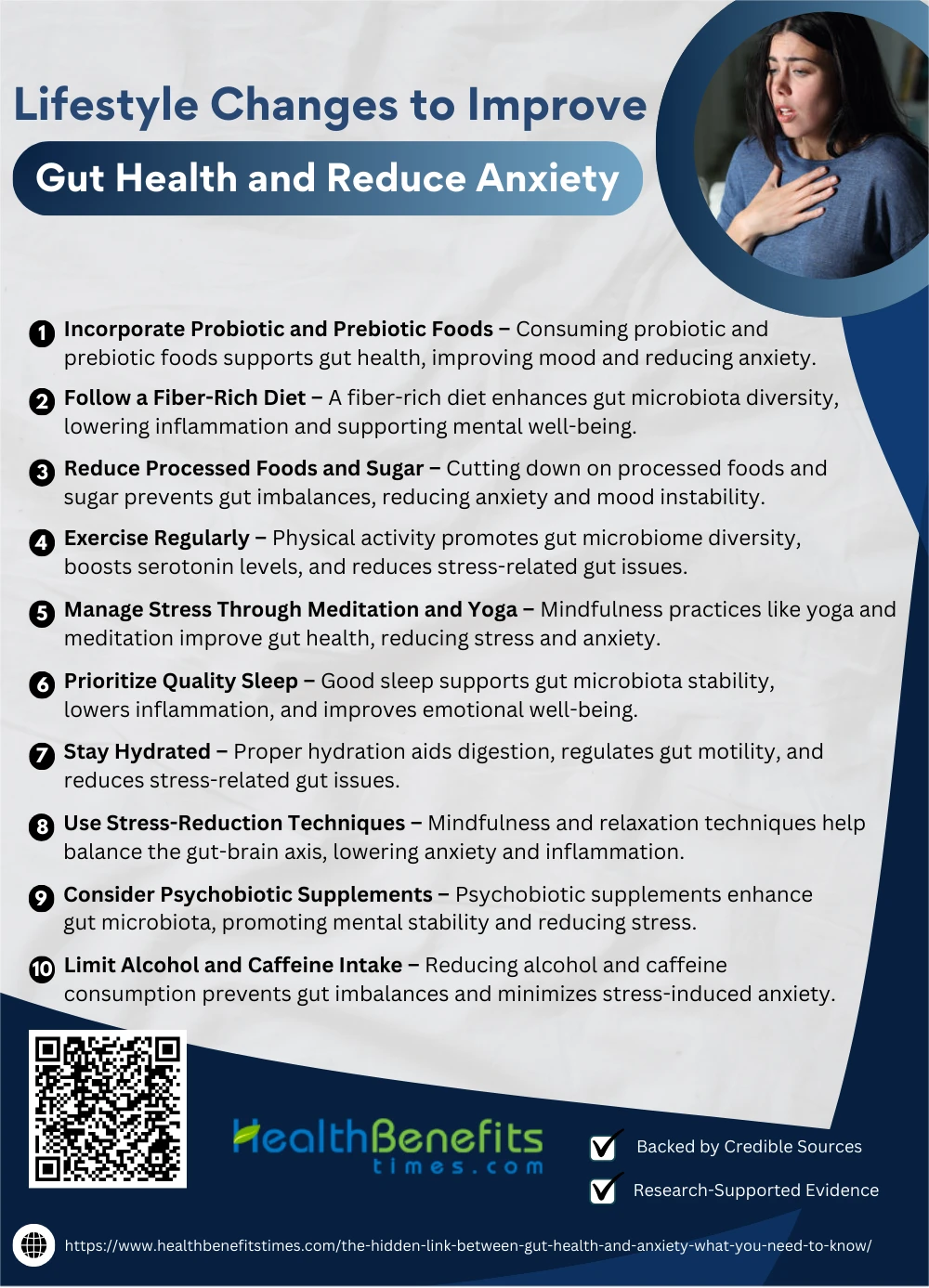- The gut-brain axis connects your digestive system and brain, influencing mood, stress levels, and mental health.
- An imbalanced gut microbiome can disrupt neurotransmitter production, leading to increased anxiety, brain fog, and mood swings.
- Supporting gut health through diet, probiotics, and lifestyle changes can help reduce anxiety and improve overall well-being.
 Gut health refers to the balance of microorganisms that live in the digestive tract, playing a crucial role in digestion, immune function, and even mental health. Recent scientific research has uncovered a compelling connection between gut health and mental well-being, particularly in relation to anxiety disorders. The gut is often referred to as the “second brain” due to the vast network of neurons in the enteric nervous system and its role in producing neurotransmitters like serotonin and dopamine. Studies suggest that an imbalance in gut microbiota—known as dysbiosis—can trigger inflammation, disrupt brain function, and contribute to mood disorders such as anxiety. Furthermore, findings indicate that individuals experiencing gastrointestinal issues are more likely to suffer from anxiety, illustrating how gut distress can directly impact mental health. As scientific interest in the gut-brain axis grows, it is becoming evident that maintaining a healthy gut is not just about digestion—it is essential for emotional and psychological well-being.
Gut health refers to the balance of microorganisms that live in the digestive tract, playing a crucial role in digestion, immune function, and even mental health. Recent scientific research has uncovered a compelling connection between gut health and mental well-being, particularly in relation to anxiety disorders. The gut is often referred to as the “second brain” due to the vast network of neurons in the enteric nervous system and its role in producing neurotransmitters like serotonin and dopamine. Studies suggest that an imbalance in gut microbiota—known as dysbiosis—can trigger inflammation, disrupt brain function, and contribute to mood disorders such as anxiety. Furthermore, findings indicate that individuals experiencing gastrointestinal issues are more likely to suffer from anxiety, illustrating how gut distress can directly impact mental health. As scientific interest in the gut-brain axis grows, it is becoming evident that maintaining a healthy gut is not just about digestion—it is essential for emotional and psychological well-being.
Understanding the Gut-Brain Connection
The gut-brain connection refers to the bidirectional communication between the gut microbiota and the central nervous system, influencing cognitive function and emotional well-being. Research suggests that an imbalance in gut bacteria can trigger neurological and psychiatric conditions, including anxiety and depression. Recent studies also highlight how gut microbiota can regulate neurotransmitter production, impacting mood and behavior. Understanding this link may open new avenues for mental health interventions.
The Hidden Link between Gut Health and Anxiety—What You Need to Know
Your gut and brain are more connected than you think. An imbalanced gut can trigger anxiety, stress, and mood swings. Understanding this hidden link can help improve both your mental and digestive health.
1. The Gut-Brain Axis Directly Influences Mood
The gut-brain axis plays a crucial role in mood regulation by facilitating bidirectional communication between the gut microbiota and the central nervous system. Studies show that gut dysbiosis can disrupt neurotransmitter production, leading to mood disorders such as anxiety and depression. (1) The gut microbiome influences serotonin levels, a key neurotransmitter for emotional stability. (2) Chronic stress further exacerbates gut imbalance, leading to increased anxiety. (3) Probiotics and dietary changes have been shown to enhance mood stability by restoring gut balance. (4) Understanding and maintaining gut health can thus be an effective strategy in mental health care. (5)
2. Dysbiosis Triggers Stress and Anxiety
Dysbiosis, an imbalance in gut microbiota, disrupts the gut-brain axis, leading to increased stress and anxiety levels. Studies show that chronic sleep deprivation can induce anxiety by altering gut microbiota composition. (6) Gut dysbiosis also contributes to oxidative stress and inflammation, impacting neurotransmitter function. (7) Stress-induced gut microbiota alterations have been linked to increased anxiety-like behaviors. (8) Furthermore, changes in gut bacteria can affect serotonin production, worsening stress responses. (9) Targeting gut microbiota through probiotics or diet may help mitigate these effects. (10)
3. Inflammation in the Gut Can Affect Mental Health
Chronic inflammation in the gut has been identified as a key factor in the development of anxiety and other mental health disorders. Inflammatory markers in the gut have been linked to neuropsychiatric disorders, impacting brain function and mood regulation. (7) The gut microbiota regulates immune responses, and dysregulation can lead to chronic inflammation, increasing stress and anxiety. (11) High-fat diets have been shown to trigger widespread inflammatory responses, exacerbating anxiety-like behaviors. (12) Emotional distress can further enhance gut inflammation, creating a vicious cycle of stress and poor gut health. (13) Addressing inflammation through gut-friendly dietary and probiotic interventions can help mitigate anxiety symptoms. (14)
4. Leaky Gut Syndrome and Psychological Stress
Leaky gut syndrome occurs when the intestinal barrier becomes permeable, allowing toxins and harmful bacteria to enter the bloodstream, leading to inflammation and mental health issues. Research suggests that increased gut permeability contributes to anxiety and stress-related disorders. (15) Psychological stress has been shown to weaken gut barrier integrity, exacerbating symptoms of anxiety. (16) Studies indicate that inflammation caused by a leaky gut triggers neuroinflammation, which negatively affects mood and cognitive function. (17) Prolonged exposure to stress can alter microbiota composition, further aggravating gut permeability and mental distress. (18) Dietary and probiotic interventions may help repair the gut lining and reduce psychological stress. (19)
5. Probiotics May Help Reduce Anxiety Symptoms
Probiotics have been shown to play a significant role in reducing anxiety by restoring gut microbiota balance and improving neurotransmitter function. Studies indicate that probiotic supplementation can lower stress-induced anxiety behaviors by modulating the gut-brain axis. (20) Lactobacillus and Bifidobacterium strains have been found to enhance GABA production, a neurotransmitter that promotes relaxation and reduces anxiety. (21) A randomized trial demonstrated significant reductions in anxiety symptoms among individuals taking probiotic supplements for eight weeks. (22) Gut microbiota-targeted interventions are increasingly being recognized as potential treatments for anxiety disorders. (23) Future research continues to investigate the long-term impact of probiotics on mental health and stress resilience. (24)
6. Serotonin Production in the Gut Affects Emotional Health
The gut is responsible for producing nearly 90% of the body’s serotonin, a key neurotransmitter that regulates mood and anxiety. Research suggests that disruptions in gut microbiota can lead to imbalances in serotonin levels, contributing to emotional distress. (25) Certain gut bacteria, such as Escherichia coli, play a crucial role in serotonin synthesis and regulation. (26) A deficiency in gut-derived serotonin has been linked to increased anxiety and depressive behaviors. (27) Furthermore, gut microbiota imbalances can impact the availability of tryptophan, the amino acid precursor for serotonin production. (28) Addressing gut health through diet and probiotics may help improve serotonin regulation and reduce anxiety symptoms. (29)
7. Diet Plays a Crucial Role in Anxiety Management
Diet has a profound impact on gut health and anxiety regulation, as certain nutrients can promote a balanced microbiome and reduce inflammation. Studies show that diets rich in fiber, fermented foods, and omega-3 fatty acids can support gut bacteria diversity, leading to improved mood stability. (7) Consuming probiotics and prebiotics has been linked to reduced symptoms of anxiety by fostering a healthy gut environment. (30) Conversely, diets high in processed foods and sugar may contribute to gut dysbiosis, increasing stress and anxiety levels. (9) The gut-brain axis relies on dietary nutrients like tryptophan to produce serotonin, highlighting the importance of a balanced diet for mental well-being. (31) Implementing dietary changes focused on gut health may serve as a natural and effective approach to anxiety management ([learn about gut-focused
8. Chronic Stress Can Damage Gut Barrier Function
Chronic stress weakens the gut barrier by increasing intestinal permeability, leading to inflammation and anxiety-related symptoms. Studies have shown that prolonged stress disrupts the gut microbiota, affecting neurotransmitter production and emotional regulation. (6) Research indicates that stress-induced changes in gut microbiota can lead to increased inflammation, impairing gut barrier function and worsening anxiety. (32) Chronic stress also alters immune responses in the gut, which may contribute to neuropsychiatric disorders. (9) Furthermore, alterations in gut microbiota have been linked to the proliferation of inflammatory microbes, increasing vulnerability to anxiety and depression. (33) Implementing stress management techniques and dietary interventions may help restore gut health and mitigate the effects of chronic stress. (34)
Signs Your Gut Health May Be Affecting Your Anxiety
Digestive issues, brain fog, and mood swings could signal a deeper problem—your gut health. An imbalanced gut microbiome can contribute to anxiety, affecting your mental well-being in ways you might not expect.
1. Frequent Digestive Issues
Frequent digestive issues such as bloating, gas, and irregular bowel movements may signal gut dysbiosis, which can contribute to anxiety. Studies show that individuals with gut-related disorders often experience higher levels of anxiety and depression. (35) Poor gut health can disrupt the gut-brain axis, leading to heightened emotional responses. (36) Gastrointestinal discomfort can trigger the release of stress hormones, further exacerbating anxiety symptoms (learn more about stress and digestion). Addressing digestive imbalances through diet and probiotics can help restore gut function and alleviate anxiety. (37)
2. Increased Sensitivity to Stress
Poor gut health can increase sensitivity to stress, making individuals more reactive to stressful situations. Research shows that imbalances in gut microbiota can alter stress hormone regulation, leading to heightened anxiety responses. (38) The gut-brain connection influences the nervous system, and disruptions in gut health may contribute to chronic stress-related disorders. (39) Studies indicate that individuals with poor gut health experience exaggerated physiological stress responses, worsening anxiety symptoms. (40) Maintaining a balanced gut microbiome through probiotics and a healthy diet may help regulate stress responses and reduce anxiety levels. (41)
3. Unexplained Mood Swings
Unexplained mood swings can be a sign of gut dysbiosis, where an imbalance in gut bacteria disrupts neurotransmitter production. Studies indicate that the gut microbiota plays a role in regulating serotonin and dopamine, which influence emotional stability. (42) Individuals with irritable bowel syndrome (IBS) often report heightened anxiety and mood fluctuations due to gut-brain axis dysfunction. (43) Research shows that gut inflammation can impact mental well-being, leading to unpredictable mood shifts. (44) Probiotics and dietary interventions may help balance gut bacteria and stabilize mood patterns. (45)
4. Poor Sleep and Fatigue
Poor sleep and chronic fatigue are commonly linked to gut health issues, as disruptions in microbiota can affect sleep-regulating hormones like melatonin. Studies show that individuals with gastrointestinal disorders often experience poor sleep quality and higher fatigue levels. (35) Imbalances in gut bacteria can alter the body’s circadian rhythm, making it harder to achieve restful sleep. (42) Additionally, gut inflammation may contribute to daytime fatigue by increasing systemic inflammation and stress hormone levels. (43) Addressing gut health through probiotics and prebiotic-rich diets can support better sleep and reduce fatigue. (44)
5. Food Sensitivities and Inflammation
Food sensitivities can trigger inflammation in the gut, which may contribute to anxiety and mood imbalances. Studies indicate that gut inflammation can affect neurotransmitter production, increasing stress responses. (40) Certain food intolerances can lead to increased gut permeability, allowing harmful substances to enter the bloodstream and impact mental health. (46) Research highlights that gluten and dairy intolerance may exacerbate anxiety symptoms due to inflammatory responses. (44) Dietary modifications, such as reducing inflammatory foods and increasing probiotics, may help stabilize gut health and alleviate anxiety. (45)
6. Frequent Sugar and Carb Cravings
Frequent cravings for sugar and refined carbohydrates can indicate an imbalance in gut microbiota, which affects mood and anxiety levels. Studies suggest that gut dysbiosis may drive sugar cravings by altering neurotransmitter signaling. (47) Consuming excessive sugar can worsen gut inflammation, leading to increased stress and anxiety. (46) Research has linked high-carb diets to mood instability due to fluctuations in blood sugar and gut microbial changes. (48) A balanced diet with fiber and healthy fats may help regulate cravings and improve gut health. (49)
7. Brain Fog and Difficulty Concentrating
Brain fog and difficulty concentrating can be linked to gut health issues that disrupt neurotransmitter function. Research shows that gut inflammation affects cognitive function, leading to memory and focus problems. (50) The gut-brain axis plays a crucial role in mental clarity, and disruptions in gut bacteria may contribute to cognitive fatigue. (51) Chronic gut-related conditions, such as irritable bowel syndrome (IBS), have been associated with increased mental fatigue and difficulty processing information. (52) Probiotics and dietary changes may help restore gut balance and improve mental sharpness. (53)
8. Weakened Immune System
A weakened immune system can be a sign of poor gut health, as the gut microbiome plays a vital role in immune regulation. Studies indicate that an imbalanced gut microbiota can lead to increased susceptibility to infections and chronic inflammation. (54) Gut bacteria influence the production of immune-modulating compounds, which help protect against stress-related illnesses. (55) Chronic inflammation in the gut has been linked to autoimmune conditions and mental health issues, including anxiety. (56) Strengthening gut health through prebiotics, probiotics, and a fiber-rich diet can enhance immune resilience and support mental well-being. (57)
9. Chronic Inflammation in the Body
Chronic inflammation in the body is linked to mental health disorders, including anxiety, due to its effects on the gut-brain axis. Studies suggest that prolonged inflammation can increase stress hormone levels, worsening anxiety symptoms (see research on inflammation and anxiety). Obesity-induced inflammation has been shown to exacerbate neuropsychiatric disorders. (9) Gut microbiota imbalances contribute to systemic inflammation, impacting emotional regulation. (58) Managing gut health through an anti-inflammatory diet may help mitigate anxiety-related inflammation. (59)
10. Unusual Reactions to Probiotic Foods
Some individuals experience unusual reactions to probiotic foods, which may indicate an imbalanced gut microbiome struggling to process bacterial changes. Research suggests that sudden alterations in gut bacteria can lead to temporary bloating and discomfort. (57) Increased anxiety following probiotic consumption may be due to histamine-producing bacteria affecting neurotransmitter balance. (60) Gut dysbiosis can make it difficult to tolerate certain probiotic strains, leading to digestive distress (gut bacteria intolerance study). Adjusting probiotic intake and selecting strains compatible with gut health can help mitigate adverse reactions. (61)
Lifestyle Changes to Improve Gut Health and Reduce Anxiety
Simple lifestyle changes can improve gut health and ease anxiety. From mindful eating to stress management and better sleep, small adjustments can create a balanced microbiome and support mental well-being naturally.
1. Incorporate Probiotic and Prebiotic Foods
Probiotic and prebiotic foods support a healthy gut microbiome, which plays a crucial role in mental well-being. Research suggests that probiotics help regulate neurotransmitter activity, reducing anxiety symptoms. (62) Prebiotics, found in fiber-rich foods, promote the growth of beneficial bacteria, enhancing gut-brain communication and reducing stress-related disorders. (63)
2. Follow a Fiber-Rich Diet
A fiber-rich diet fosters gut microbiota diversity, which can lower inflammation and improve mental health. Studies show that fiber intake is associated with lower levels of anxiety and depression due to its role in gut-brain axis regulation. (64) Additionally, dietary fiber influences immune responses, helping reduce stress-related inflammation and supporting cognitive function. (65)
3. Reduce Processed Foods and Sugar
Processed foods and high sugar intake disrupt gut microbiota, leading to inflammation and an increased risk of anxiety. Research indicates that diets rich in processed foods negatively impact gut health, contributing to mental distress. (66) Reducing sugar and consuming whole, nutrient-dense foods can enhance gut microbiota diversity, improving serotonin production and emotional stability. (67)
4. Exercise Regularly
Regular physical activity improves gut microbiome diversity, reducing inflammation and anxiety. Studies show that exercise enhances gut-brain communication, increasing serotonin and dopamine levels that promote mental well-being. (67) Additionally, movement-based activities like yoga and aerobic workouts can help alleviate stress-induced gut issues, supporting overall digestive and psychological health. (68)
5. Manage Stress Through Meditation and Yoga
Meditation and yoga help reduce stress by regulating the gut-brain axis, lowering inflammation, and improving gut microbiota composition. Research shows that mindfulness practices can mitigate anxiety by enhancing gut health and reducing stress hormones. (11) Additionally, yoga and meditation support emotional regulation, decreasing stress-induced gut disorders and enhancing mental well-being. (69)
6. Prioritize Quality Sleep
Quality sleep plays a vital role in gut health by maintaining a balanced microbiome and reducing stress-induced inflammation. Studies show that poor sleep disrupts gut bacteria diversity, increasing anxiety levels and stress-related symptoms. (41) Prioritizing sleep hygiene improves neurotransmitter function and gut microbiota stability, supporting overall mental well-being. (41)
7. Stay Hydrated
Proper hydration is essential for maintaining gut health, as it aids digestion and supports a balanced microbiome. Studies show that dehydration can negatively affect mood and increase stress levels, contributing to anxiety. (70) Drinking sufficient water also helps regulate gut motility and supports the body’s natural detoxification processes, reducing inflammation and stress-related gut issues.
8. Use Stress-Reduction Techniques
Stress reduction techniques like mindfulness and deep breathing exercises help regulate the gut-brain axis, reducing inflammation and anxiety. Research shows that mindfulness-based stress reduction techniques improve gut health and emotional well-being. (71) Techniques such as progressive muscle relaxation and guided imagery have been shown to lower stress hormone levels, improving gut microbiota diversity and digestive health. (71)
9. Consider Psychobiotic Supplements
Psychobiotic supplements, which contain beneficial bacteria, have been shown to support mental health by modulating the gut-brain axis. Research indicates that psychobiotics can help alleviate anxiety and depressive symptoms by enhancing neurotransmitter production. (72) Additionally, these supplements improve gut microbiota diversity, reducing stress-induced inflammation and promoting emotional stability. (73)
10. Limit Alcohol and Caffeine Intake
Excessive alcohol and caffeine consumption can disrupt gut microbiota, leading to heightened stress and anxiety. Studies show that alcohol negatively impacts gut permeability, increasing inflammation and stress responses. (74) Similarly, high caffeine intake can overstimulate the nervous system, contributing to anxiety and digestive issues. (75) Reducing intake of these substances can help restore gut balance and improve mental well-being.
When to consult a doctor or nutritionist
If you experience persistent digestive discomfort, unexplained anxiety, or chronic inflammation, consulting a doctor or nutritionist is essential. Studies indicate that gut-related conditions like irritable bowel syndrome (IBS) or inflammatory bowel disease (IBD) can significantly impact mental health and require professional evaluation. (76) Additionally, individuals struggling with chronic stress, food intolerances, or unexplained weight loss should seek expert advice, as nutritional therapy plays a critical role in gut-brain health. (77) Early intervention can help manage symptoms effectively and improve overall well-being.
Conclusion
Understanding the hidden link between gut health and anxiety empowers you to take control of both your digestive and mental well-being. A balanced gut microbiome supports neurotransmitter production, reduces inflammation, and strengthens the gut-brain connection, helping to ease anxiety symptoms. By making mindful dietary choices, managing stress, and adopting healthy lifestyle habits, you can positively influence your gut and, in turn, your mood. If anxiety persists, consulting a healthcare professional for personalized guidance can provide deeper insights. Prioritizing gut health isn’t just about digestion—it’s a crucial step toward a healthier, calmer mind.




